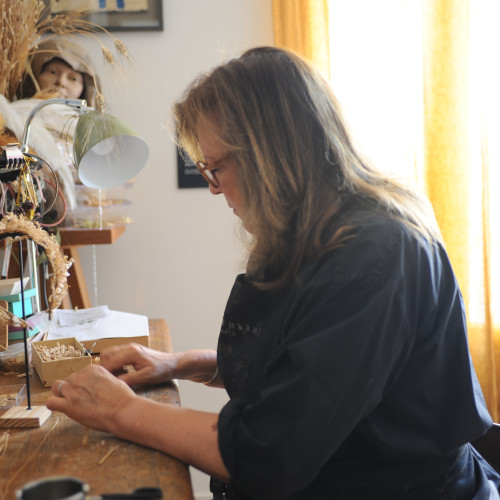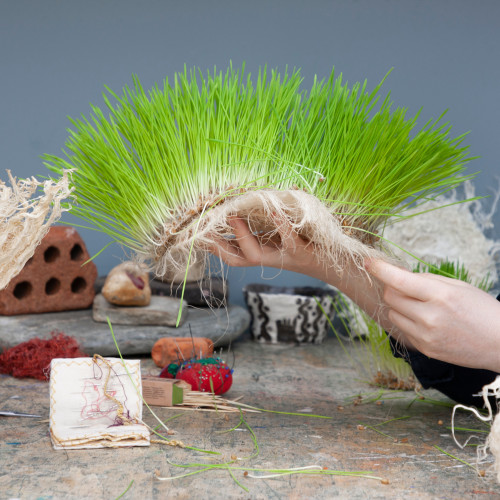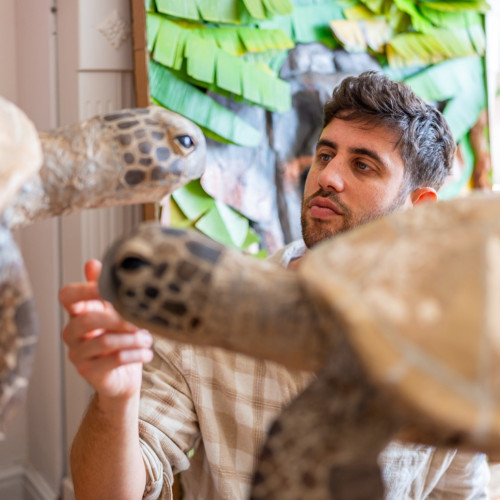
Homo Faber NextGen - Homo Faber Fellowship - TRAINEE TESTIMONIAL 2022
Lucía Ponce, l'une des premières participantes du programme Trainee to Professional de la Michelangelo Foundation, a passé six mois en formation auprès des maîtres verriers Bianca Rebagliati et Daniel Orquín au sein de l’atelier de verre 40plumas à Barcelone. C’est dans cet atelier que cette diplômée en archéologie a acquis le savoir-faire nécessaire pour se réorienter dans une nouvelle carrière d’artisan-verrier. Elle nous livre ses réflexions sur son parcours de formation.
Pourquoi avez-vous choisi de participer à ce programme ?
J’ai toujours voulu apprendre à travailler le verre, un matériau que j’adore, mais j’ai choisi d’étudier l’archéologie en raison des plus grandes perspectives de carrière. Je me suis spécialisée dans la conservation et la restauration et, par chance, cela m’a amenée à devoir restaurer un vitrail ; tout ce qu’il fallait pour me rappeler à quel point j’adorais le verre ! J’ai appris, par un de mes professeurs, que le studio 40plumas était à la recherche d’un stagiaire. J’ai dit « banco » !
Qu’avez-vous découvert à propos du travail du verre ?
Que c’est un métier singulier, à la fois exigeant et complexe. Le verre a cette merveilleuse faculté de passer d’un état liquide et malléable à l’état solide. Aussi, malgré sa fragilité apparente, il résiste bien au poids et au temps qui passe. C’est quelque chose que j’ai aussi observé lors de la découverte, dans des fouilles archéologiques, d’objets en verre qui avaient traversé les âges quasiment intacts.
Qu’avez-vous appris chez 40plumas ?
J’ai eu la chance de pouvoir observer la pluralité du travail du verre. En effet, les artisans de l’atelier maîtrisent toute une panoplie de techniques. J’en ai appris quelques-unes, que ce soit le travail à chaud comme le soufflage et le travail au chalumeau ou le travail à froid comme la sculpture, le sablage et le meulage. Grâce à cela, j’ai pu identifier celle dans laquelle j’aimerais me spécialiser. Il s’agit de la technique de travail au chalumeau car elle me permet de créer de petits objets et accessoires de décoration.
Quel a été le point fort de cette expérience ?
D’avoir eu la chance d’apprendre au sein de l’un des meilleurs ateliers de verre d’Espagne. Derrière les méthodes et les solutions créatives de Bianca et Daniel, on ressent toute la passion pour le verre qui les anime et qu’ils m’ont d’ailleurs transmis dès le premier jour de mon stage. Même si c’est un métier difficile qui demande des heures et des heures de travail pour mener à bien un projet, lorsqu’on voit le résultat final, on se dit que cela en vaut l’investissement.
Comment voyez-vous le travail du verre en Espagne ?
Malheureusement, les ateliers disparaissent petit à petit, non seulement ici en Espagne, mais dans le monde entier. Lors de mon stage, j’ai remarqué que la majorité des personnes intéressées par l’achat d’objets en verre sont des étrangers. C’est un métier qui demande beaucoup d’efforts et de dévouement mais ici, en Espagne, peu de gens s’en rendent compte. Malgré tout, il y a encore une clientèle qui sait apprécier ce matériau ainsi que les formes et les textures qu’on peut en tirer. Ce sont précisément ces personnes qui contribuent à faire perdurer les ateliers d’artisanat.
Quels sont vos futurs projets de carrière ?
Je vais poursuivre ma formation afin d’en apprendre encore davantage sur les différentes techniques et surtout le travail au chalumeau. Pour l’heure, je sais comment fabriquer de petits objets, mais je compte bien apprendre à en fabriquer de plus gros.
Les métiers d’art offrent-ils des perspectives de carrière viable pour les jeunes en Espagne ?
Selon moi, nous sommes à un moment charnière pour les métiers d’art. Les jeunes sont de plus en plus intéressés par les objets faits à la main et ils sont nombreux à s’inscrire à des cours pour apprendre à réaliser leurs propres créations. Alors, oui, je pense que les métiers d’art peuvent être valorisés comme ils l’étaient auparavant et ils peuvent représenter un choix de carrière viable.
Notes for editors
michelangelofoundation.org
@homofaber
The Michelangelo Foundation for Creativity and Craftsmanship is a non-profit institution based in Geneva, Switzerland, which champions contemporary craftspeople worldwide with the aim of promoting a more human, inclusive and sustainable future. The Foundation seeks to highlight the connections between craft, the wider arts and the design world. Its mission is to both celebrate and preserve craftsmanship and its diversity of makers, materials and techniques, by increasing craft’s everyday recognition and its viability as a professional path for the next generations. From engaging educational programmes such as the Summer Schools, to its signature digital project the Homo Faber Guide and the international exhibition Homo Faber Event, the Foundation is fostering a cultural movement centred on master artisans and rising stars. michelangelofoundation.org
Fondazione Cologni dei Mestieri d’Arte is a private, non-profit institution founded in 1995. Based in Milan, it promotes cultural, academic and educational initiatives for the protection and diffusion of Italian artistic crafts. The Fondazione Cologni’s mission is to inspire a “new Renaissance” of the artistic crafts and rescue them from the threat of extinction. Many of its initiatives focus on young people and training future generations of artisans. fondazionecologni.it
Asociación Contemporanea de Artes y Oficios (ACAO) is an association that promotes both traditional and contemporary Spanish crafts. They seek to protect Spanish craftsmanship, and use it to foster the development of culture, history and art and boost its economic benefits on the environment and tourism industry. Their main targets are to ensure an environment in which Spanish craftspeople can thrive and to aid them in having further commercial reach in Spain and internationally. The ACAO collaborates with similar institutions to ideate best practices; they assist with the development of commercial platforms for craftspeople; they organise seminars, forums and talks. Beyond this, they use media for widespread visibility for arts and crafts; they launch programmes that promote crafts and engage in research projects. Their collective expertise enables them to provide consulting services to artisans and ateliers. forodeartesyoficios.com
The Craft Project is a French non-profit association born out of the podcast which goes by the same name, which has been promoting French craftspeople and craftsmanship since 2018. The association has several aims: firstly, to create a community of artisans who collectively think of innovative strategies to build the futures of their crafts. Secondly, to raise awareness of craftsmanship among the general public by introducing them to materials and to beauty. Lastly, to encourage vocations by shedding light on exemplary destinies and adventures in the arts and crafts. thecraftproject.fr
La Tecnocreativa is a fashion and design school based in Madrid that focuses on entrepreneurship, management and sustainable development. It seeks to preserve the traditional crafts linked to the creative industries and marry them with new technologies. The school revolutionises training with a model that combines online learning, thanks to televisual technology, with in-presence seminars for certain courses. A month-long course tailored to the Trainee to Professional programme was created with partner Assocíacion Contemporánea Artes y oficios for the participating students. latecnocreativa.com
Costa Crociere Foundation was created with the aim of disseminating and developing the values of the Costa Group through the management and financing of environmental and social projects with a common interest. A commitment that manifests in supporting and developing projects to assist communities they encounter on the Costa ships’ journeys, and which focus on environmental protection and the eradication of social inequity at a global level investing. They invest 100% of the donations they receive into projects to transform the daily work they do into a promise of happiness. costacrocierefoundation.com

Homo Faber Biennial - 2024 - Artisan Portrait
May 2024

Homo Faber Biennial - 2024 - Artisan Portrait
May 2024

Homo Faber Biennial - 2024 - Artisan Portrait
May 2024